|
It had been almost two years since I'd seen
Keith, my oldest son. I'd just bought a new
pickup that I knew could survive the drive from
northeast Kansas to northern California and back.
So I decided to take a little vacation and go visit
him.
After college, Keith landed a Corps of Engineers
Park Ranger job at a northern California lake.
About a year later, he transferred to another
federal lake, one farther north up above San
Francisco.
Being I'm from Kansas and don't travel out of
state much, I'm ignorant of northern California's
outdoor recreation opportunities. So I was all
ears when during a call home, Keith began describing
the fishing options that anglers in his area
enjoy - both in number of species and fishing styles.
He then deftly mentioned that once he saved a little
more money he was going to take up the sport of fly
fishing. This, he said, would let him go after trout
up in the mountain streams and lakes, plus he could
try for migrating salmon and steelhead in the Sacramento,
Feather and other big-fish rivers.
Keith was single, a new-hire on the bottom of the
Ranger pay scale. I knew his house rent and basic
living expenses kept him tight on money. My vacation
would be the same month of his birthday. So after his
call home ended, I told my wife that for Keith's birthday
I'd like to shop around out there and buy him a good
quality fly fishing outfit. She agreed.
My vacation thoughts had always included taking along
my own fly tackle. So now I figured that after
outfitting Keith, he and I would get licensed up and
then for a week we'd try to catch whatever fish got
in our way.
On the drive west, cased in the back of my pickup cab
was a 7 ½-ft. 3-wt. IM-6 fly rod. A nifty little rig
I'd bought specifically for panfishing four years
earlier during a family vacation in McCall, Idaho.
"Bought" but hardly ever used, because after returning
home from that Idaho trip I'd gotten sidetracked by
other pursuits and had not followed through on my
panfishing ambition. So apart from being able to
cast it half-way decent - plus having 40 plus years of
general fishing experience on spin tackle, I wasn't much
of a vacationing flyfisher.
Indeed, in many respects my trip to visit Keith would
be a shakedown cruise for both of us. For him,
practically a basic training situation, whereas I hoped
to meet some experienced California fly fishers and
learn about good flies and the tactics employed to
fish them.
Turned out Keith's house sits a half-mile from Chico
Fly Shop, the place Powell fly rods were made. After
two or three visits with new co-owners Brian and John,
we got Keith outfitted with a 9-ft. 5/6 wt. rod. He'd
been hoping for just a fly rod for his birthday present,
but he quickly got over the shock of receiving not just
a rod but also a reel, backing line, floating line,
leaders, tippets, a fly box and some flies.
We immediately headed to a city park pond, where Keith
began casting practice using a piece of yarn as a dummy
fly so he wouldn't hook himself. As expected, his first
casts were atrocious. I gave him some pointers that
elevated him to the Ugly level.
"Okay, what we need to do TOMORROW," I told Keith "is go
fishing. I haven't fly fished very much and I don't know
the waters out here. But in my Kansas experience, the
classic style long casts you practiced today aren't used
much. You use the rod to put a fly where you think the
fish are, and you get that fly out there by doing whatever
it takes. Fly fishing is just another method, and the
best way to learn it is to catch fish."
Which I hoped like hell would be true for Keith. I
wanted to see this birthday present put some fish slime
on his hands. I knew it was helping him, but watching
him cast a little fluffy piece of harmless yarn was
getting on my nerves.
On the drive home from the park, Keith recalled a small
pond he knew of out in the country, in the Sierra foothills.
According to his fellow Rangers, this pond had dried up
a few years earlier. It had water in it now but likely
no fish. Still, nobody really knew. Keith had to work
the next morning, but he asked if I wanted to try it, to
scout it as a possible "practice pond"?
Well...does a duck go barefoot?
Next morning, Keith drops me off at this pond, promising
to pick me up in three hours. I tippy-toe down the bank
and cast out a foam hopper recommended by Brian at the
fly shop. First cast, and twenty seconds later I'm
unhooking and releasing a largemouth bass about 10-inches
long, then another, then another. This goes on for 10 or
15 minutes, then I move farther down the shoreline. Same
thing: soft grasshopper splash, big bang, little bass.
Fly Fishing 101 is now in session. Only problem: the
designated student is absent.
But that afternoon Keith and I return. I suggest that
he slowly work his way along the same shoreline I'd
fished that morning. "And watch your back cast.
That hill behind you rises real steep. I broke off
four flies in that dry grass." Off he went.
It's a small pond, but looked deep judging from the
slope angle of the surrounding terrain. And very
clear, almost tap water clear. I'd warned Keith
about how the bass that morning had quickly learned
to rise within striking distance of my hopper then
pause for a careful inspection - and once they'd
started doing that, my luck tapered off to nothing.
I was hoping that in the fading late afternoon light
the fish would return to their aggressive ways and
Keith could tear into 'em. That's what happened,
too. He tied on a #8 foam cricket, and in no time
flat those juvenile bass were pounding it like Sugar
Ray Leonard works a speed bag.
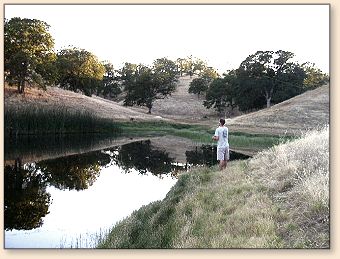
Best of all, Keith wasn't losing any crickets on his
back cast. He was playing it shrewd, slowly sneaking
the bank and using short range casts. Not pretty casts,
but his cricket was getting out there with effect.
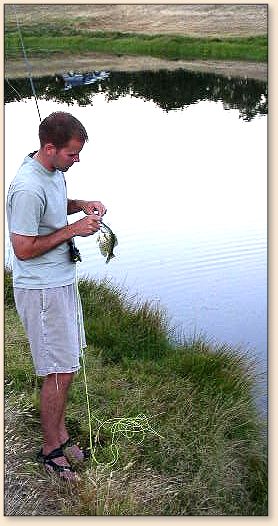 Meanwhile, I eased around the north side of the pond
to explore an area I hadn't touched that morning.
It was difficult footing due to the very steep bank
slope; luckily, I found a narrow, lateral deer trail
near the water and exploited it for safe footing.
Meanwhile, I eased around the north side of the pond
to explore an area I hadn't touched that morning.
It was difficult footing due to the very steep bank
slope; luckily, I found a narrow, lateral deer trail
near the water and exploited it for safe footing.
It was along that steep slope that I came to a line
of weeds and moss that extended from the bank to about
six feet out. The day before, I'd been visiting with
Brian at the fly shop about panfishing nymphs for use
in ponds, and he suggested the damselfly nymph. So
I tied on one I'd bought from him, cast it straight
out twenty feet past the weed line, let it sink about
ten seconds then began a very slow retrieve.
When the nymph got ten feet from the weeds my line
gave a tiny twitch and I lifted the rod. Up came...
shock!...a very nice black crappie, well fed, thick
body. At which point in my mind, all thoughts of
catching bass utterly vanished.
I had not brought a stringer because that morning all
I'd caught was bass, so I'd assumed that bass were the
only fish in the pond. I had to release this beautiful
crappie, and it hurts me even now just remembering it.
I worked the weed line a few more minutes and caught
a half dozen good crappie before forcing myself to
stop. It was torture to stop, but this weed line
was HOT with crappie and I wanted them relaxed
during my next visit - with stringer, for meal
purposes. I was now on a mission. One far from home,
but I knew Keith owned a skillet just like mine back
in Kansas.
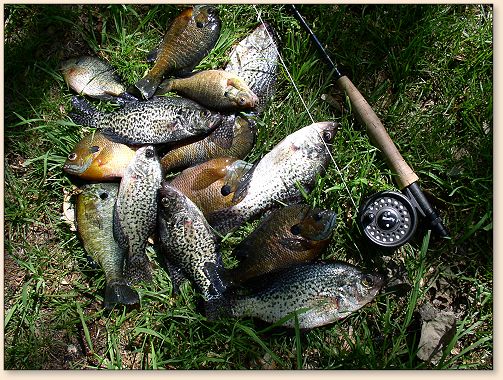
Next afternoon, I used that damselfly nymph again
and landed ten good crappie, a couple 12-inches long,
the rest over 9 inches. I quit after the tenth fish;
I wanted lots of 'em left in the pond for Keith to
enjoy and learn on.
Until this vacation, it'd been 40 years since I last
enjoyed cast and retrieve crappie action like this.
That was with spinning tackle, bobbers and lead head
jigs. Now, finally, I was again catching crappie one
after another, and doing it with tackle I never
envisioned myself ever using. At least, not until
about 4 years ago when I decided to go back to "roots"
fishing, but with a fly rod for something new and
different.
Well, for me, fly rodding for panfish is something
different, all right. In the months since last
August, I've started learning bit-by-bit, one trip
at a time, just how deadly it is. I'm 56 years old,
and since high school have pretty much succeeded in
maintaining a teenager's outlook on life. But now?
Someone says "fishing" and I feel like a little kid.
~ Joe
About Joe:
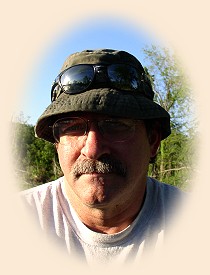 From Lawrence, Kansas, Joe is a former municipal and
federal police officer. In addition to fishing, he hunts
upland birds and waterfowl, and for the last 15 years
has pursued the sport of solo canoeing. On the nearby
Kansas River he has now logged nearly 5,000 river miles
while doing some 400 wilderness style canoe camping
trips. A musician/singer/songwriter as well, Joe's
'day job' is with the U.S. General Services Adminstration.
From Lawrence, Kansas, Joe is a former municipal and
federal police officer. In addition to fishing, he hunts
upland birds and waterfowl, and for the last 15 years
has pursued the sport of solo canoeing. On the nearby
Kansas River he has now logged nearly 5,000 river miles
while doing some 400 wilderness style canoe camping
trips. A musician/singer/songwriter as well, Joe's
'day job' is with the U.S. General Services Adminstration.
Joe at one time was a freelance photojournalist who wrote the
Sunday Outdoors column for his city newspaper. Outdoor
sports, writing and music have never earned him any money,
but remain priceless activities essential to surviving the
'day job.'
|

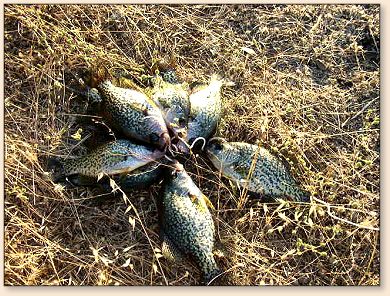



 From Lawrence, Kansas, Joe is a former municipal and
federal police officer. In addition to fishing, he hunts
upland birds and waterfowl, and for the last 15 years
has pursued the sport of solo canoeing. On the nearby
Kansas River he has now logged nearly 5,000 river miles
while doing some 400 wilderness style canoe camping
trips. A musician/singer/songwriter as well, Joe's
'day job' is with the U.S. General Services Adminstration.
From Lawrence, Kansas, Joe is a former municipal and
federal police officer. In addition to fishing, he hunts
upland birds and waterfowl, and for the last 15 years
has pursued the sport of solo canoeing. On the nearby
Kansas River he has now logged nearly 5,000 river miles
while doing some 400 wilderness style canoe camping
trips. A musician/singer/songwriter as well, Joe's
'day job' is with the U.S. General Services Adminstration. Meanwhile, I eased around the north side of the pond
to explore an area I hadn't touched that morning.
It was difficult footing due to the very steep bank
slope; luckily, I found a narrow, lateral deer trail
near the water and exploited it for safe footing.
Meanwhile, I eased around the north side of the pond
to explore an area I hadn't touched that morning.
It was difficult footing due to the very steep bank
slope; luckily, I found a narrow, lateral deer trail
near the water and exploited it for safe footing.